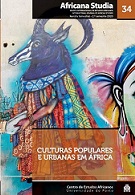Jogos, lazer e repúdio: conexões e identidades em Moçambique (1960-1984)
Abstract
This study takes a social and anthropological approach. It is based in some historical, political as well as social aspects that deal with “folklore” games which were used for political manifestations during the colonial period and after independence.
The aim of my study is to explore the role of these games, such as Ntxuva, the Xindiru, as well as the Jóu- Já!, the Mba-lele Mbalele, the Pim-pa-pó, Karingana Wha Karingana, the Neca, the Mathakuzana, the Lobo volta amanhã, the Papagaio, the Futebol with Xingufu, the Rolamento, the Matué-twé, the Mapiko, the Tufo, Zore, Nhau, Ngalanga, the Xigubo. I argue that
the games were used by people for leisure and as reaction to their permanent exclusion from sophisticated games. The other aspect to consider is that songs against the colonial system accompanied the games, at the same time that they served as an instrument of revolution. My study will focus on the south of Mozambique, particularly, in the Ntxuva of the Railways Company
(Caminhos de Ferro) and Xindiru from Xinhembanine in relation to this repudiation.
Keywords: Game, Ntxuva, Xindiru, Mozambique.
Downloads
Downloads
Published
How to Cite
Issue
Section
License
Copyright (c) 2021 Africana Studia

This work is licensed under a Creative Commons Attribution-NonCommercial 4.0 International License.
Copyrights of all published material belong to Africana Studia.
Original images supplied by authors will be returned to them if requested


